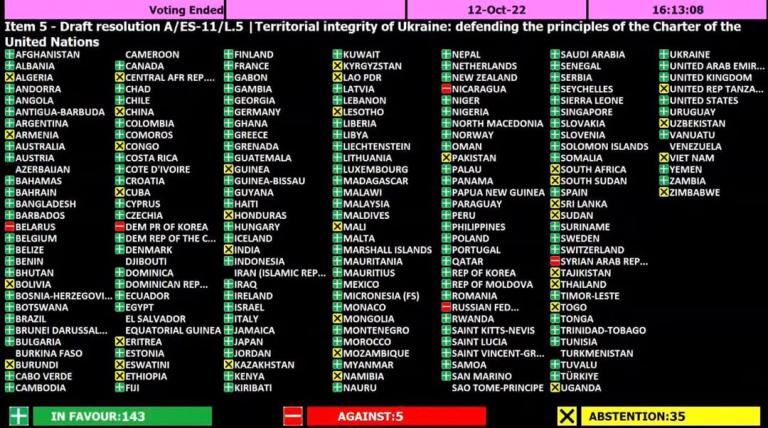Sudan’s abstention policy on Russia
October 16, 2022 (KHARTOUM) – Sudan has abstained in the United Nations General Assembly (UNGA) vote on Wednesday over a resolution that condemns Russia’s annexation of four Ukrainian regions and affirms support for Ukraine’s territorial integrity.
UNGA members voted overwhelmingly in favour of it while only 4 countries opposed it and 35 abstained.
Treading a fine line: Given the complexities associated with internal dynamics following last year’s military coup, it has appeared that Sudan is tilting towards the east in its foreign relations which seemingly contrasted with the strategy of the previous civilian government of Prime Minister Abdulla Hamdok that sought to create a balance in its dealings with the international community.
A senior official at the Sudanese ministry of foreign affairs argued that Sudan has maintained its positive neutrality stance on all Russia-related resolutions by simply abstaining.
The diplomat pointed out to Sudan Tribune another resolution against Russia that was adopted this week in the United Nations Human Rights Council (UNHRC) which resulted in the appointment of a special rapporteur to monitor the human rights situation in Russia to which Sudan also abstained.
The diplomat emphasized that Sudan’s position seeks to strike a balance between the need to respect the UN charter and international law while also taking into account its national interests and international balances. He affirmed that Khartoum’s official position is to abstain on similar Russia-related resolutions.
“The abstaining bloc has recently grown while Sudan has maintained this position since the outbreak of the Russian-Ukrainian war,” the diplomat said.
Another diplomat suggested that the military is the one behind this policy and that they currently prioritize Russia relations. He dismissed speculations of any pressures applied by Moscow to go in this direction.
Political Ambiguity: The Professor of International Relations at the University of Khartoum Tomader al-Tayeb said that abstention in these votes could sometimes be construed as an attempt to be ambiguous.
Dr. al-Tayeb went on to say that Khartoum may simply be unwilling to clarify its position on the matter which she believes may not be the best policy and that Sudan should have clearly articulated its thinking to the international community.
She acknowledged however that the current internal situation may have played a factor in Sudan’s vote.
Traditional allies: The former foreign ministry spokesman al-Obeid Marrouh explained to {Sudan Tribune} that countries adopt positions on UNGA resolutions based on many factors that all converge on supreme national interests.
He noted Sudan’s vote was to be expected given Russia’s traditional support of Sudan at the UN Security Council (UNSC) in the past and its consistency in frustrating attempts to impose punitive measures against Khartoum pushed by Western countries.
“We can also say, based on the results of the vote, that the ruling authority in Sudan is still keen on good relations with its traditional allies in Moscow and Beijing, and that it wants to send a message to Western nations that its keenness to normalize relations with it is not at the expense of relations with the East” Marrouh added.
Clear signals: Last February and in the hours leading to the Russian invasion of Ukraine, the Rapid Support Forces (RSF) commander and deputy head of the Sovereign Council Mohamed Hamdan Dagalo (Hemedti) landed in Moscow on an official visit.
The controversial week-long visit, which raised a storm of questions about its significance and timing, laid the foundations for the transformation of diplomatic relations away from Europe and the United States which condemned the military coup.
Shortly after, Sudan also abstained from voting on a UNGA draft resolution condemning the Russian invasion of Ukraine.
It is also to be noted that the issue of the Russian naval base in the Red Sea has been lingering even before the coup which appeared to be an attempt to carry favours with Moscow while also using it as a bargaining chip with the west.
Last month, the U.S ambassador to Sudan John Godfrey warned of consequences if Khartoum allows Russia to establish this base.
“If the government of Sudan decides to proceed with the establishment of this facility, or to renegotiate it, it will be harmful to Sudan’s interest”.
“All countries have a sovereign right to decide which other countries to partner with, but these choices have consequences, of course,” he stressed.
(ST)

